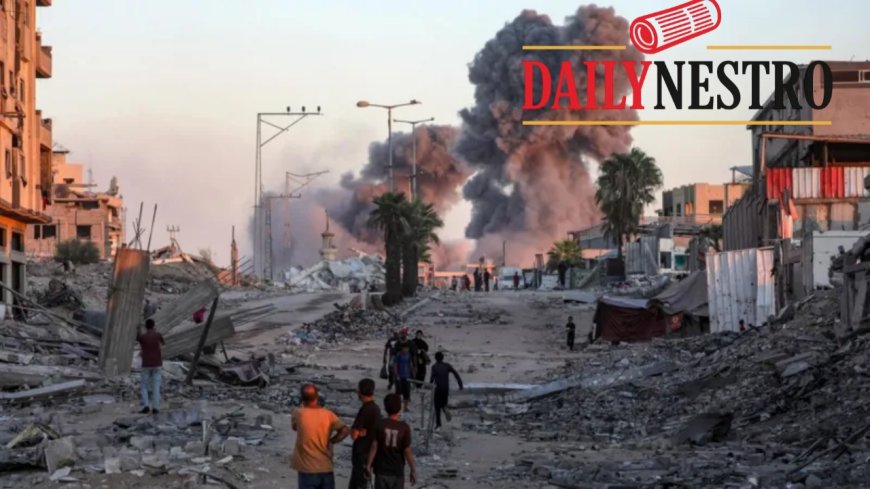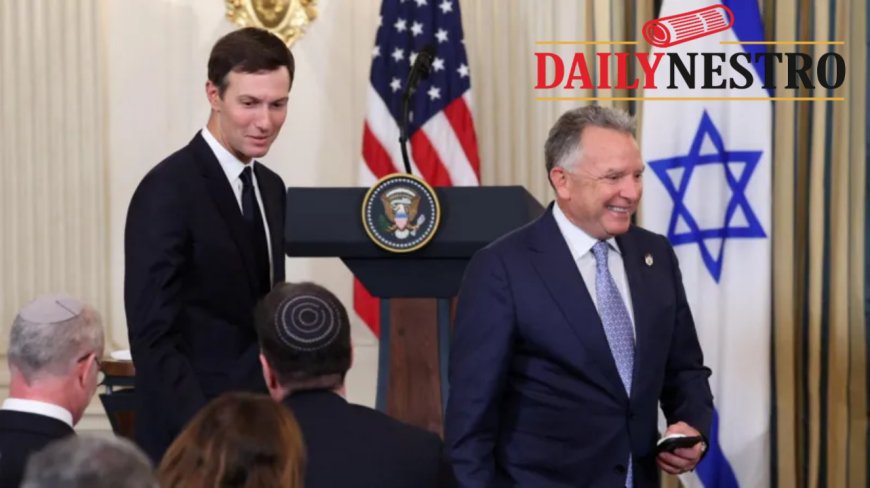US and Regional Mediators Intensify Talks to End Gaza War in Egypt
Key mediators from the United States, Egypt, Qatar, and Turkey have launched renewed talks in Egypt aimed at ending the Gaza war. With indirect negotiations between Israel and Hamas showing cautious progress, hopes are rising for a lasting ceasefire and humanitarian relief in the region.

Just in:Key US and Regional Mediators Join Talks in Push to End Gaza War
In a significant development amid ongoing efforts to resolve one of the world's most protracted conflicts, key mediators from the United States and regional powers have converged in Egypt for high-stakes negotiations aimed at brokering a ceasefire in Gaza.
This move comes as indirect talks between Israel and Hamas enter their third day, with cautious optimism emerging that a breakthrough could be on the horizon. The involvement of prominent figures signals a renewed international push to halt the violence that has plagued the region for over a year.The talks, hosted in the Egyptian resort city of Sharm el-Sheikh, have drawn top officials from multiple nations. US Special Envoy Steve Witkoff and Jared Kushner, a former senior advisor to President Donald Trump, arrived in Egypt to join the discussions.
Their participation underscores Washington's commitment to facilitating a peace deal, especially under the current administration's foreign policy framework. Qatar, a long-time mediator in Middle East affairs, has also sent senior representatives, including its Prime Minister, to bolster the negotiations. Turkey has similarly stepped in, adding its diplomatic weight to the process.

Egypt, as the host nation, continues to play a pivotal role, leveraging its geographic proximity and historical ties to both sides.This latest round of talks builds on previous mediation attempts, but there's a sense that momentum is building. Sources close to the negotiations have described the atmosphere as "very close" to a potential agreement. Hamas has submitted a list of Palestinian prisoners it seeks to have released by Israel in exchange for hostages, a key sticking point in prior discussions. On the Israeli side, officials have expressed growing optimism for a deal that could free around 48 hostages and pave the way for ending the war.
However, challenges remain, including Hamas's demand for guarantees that any ceasefire will lead to a permanent end to hostilities, not just a temporary pause. To understand the context, it's worth recalling the origins of the current conflict. The war in Gaza escalated dramatically following Hamas's attack on Israel on October 7, 2023, which resulted in significant casualties and the abduction of over 250 individuals. Israel's subsequent military response aimed to dismantle Hamas's infrastructure but has led to widespread destruction in Gaza, displacing millions and causing a humanitarian crisis. International calls for a ceasefire have intensified, with the United Nations and various NGOs highlighting the urgent need for aid delivery and civilian protection.The involvement of US envoys like Witkoff and Kushner is particularly noteworthy. Kushner, known for his role in the Abraham Accords during Trump's first term, brings experience in Middle East diplomacy.
Their presence aligns with President Trump's renewed focus on the region, including proposals that build on past initiatives to foster peace. Regional players like Qatar and Turkey add diverse perspectives; Qatar has hosted Hamas leaders and facilitated previous deals, while Turkey's involvement reflects its broader interests in Palestinian affairs.
Experts suggest that this multi-lateral approach could be the key to success. Unlike unilateral efforts, the combination of US influence, Arab mediation, and Turkish input might bridge the gaps between the parties. A senior Israeli official noted that the talks are "closer than ever" to a resolution, though major hurdles like prisoner exchanges and post-war governance in Gaza persist.
The anniversary of the war's onset has added emotional weight, with both sides expressing readiness for a deal but insisting on firm commitments.
If successful, a ceasefire could have far-reaching implications. It would not only alleviate the immediate suffering in Gaza but also open doors for reconstruction efforts, potentially funded by international donors. Economically, stability in the region could boost trade and investment, benefiting neighboring countries like Egypt and Jordan. Politically, it might strengthen moderate voices and reduce the risk of escalation involving other actors, such as Hezbollah in Lebanon or Iran.However, skepticism lingers. Past negotiations have faltered over issues like security guarantees and territorial control. Hamas has reiterated its willingness to negotiate but demands an end to what it calls the "occupation," while Israel prioritizes the return of hostages and the neutralization of threats.
Finally,The indirect nature of the talks mediated through shuttling diplomats highlights the deep mistrust between the two sides.As the world watches, the outcome of these discussions could mark a turning point. With key mediators now fully engaged, there's hope that diplomacy will prevail over conflict. For the people of Gaza and Israel, a lasting peace remains the ultimate goal, one that requires compromise, courage, and continued international support.
Source:BBC news, guardian news,CNN world







